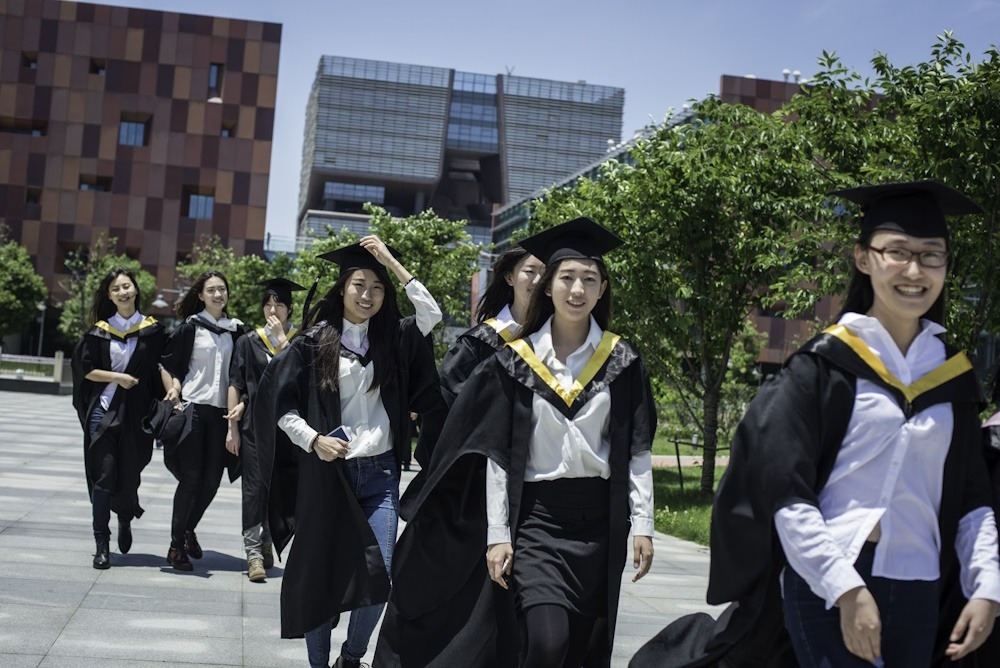American students are staying away from China

China has reopened its doors, but it seems that American students are choosing to stay away. For over a decade, Wu Xinbo has been teaching a class on China’s foreign policy at Shanghai’s Fudan University. Historically, a significant portion of his class has been comprised of American students. Then Covid-19 arrived, effectively barring the majority of international students. However, despite the resumption of regular classes at Fudan last year, none of the approximately 30 international students in Wu’s class hailed from the United States.
“I miss them,” expressed Wu, who mentioned that his American students posed engaging questions to him—and offered valuable perspectives on how Americans were perceiving China.
American students have been hesitant to return to China since Beijing lifted its strict Covid restrictions in late 2022. In spite of the promises made by Beijing and Washington to enhance interactions between ordinary Chinese and Americans, there seems to be a lack of progress. Chinese leader Xi Jinping expressed optimism during a November summit with President Biden about attracting 50,000 American students to China in the next five years, but it remains to be seen if this goal will be achieved.
During the previous academic year, more than 11,000 Americans chose to study in China, solidifying its position as a top choice for U.S. students studying abroad. This data, provided by the Institute of International Education, highlights China’s popularity as a non-European destination and its overall ranking as the seventh most preferred location. In June 2023, according to the IIE, China did not rank within the top 20.
According to Nicholas Burns, the U.S. ambassador to Beijing, there are approximately 800 Americans currently studying in China, although there is no official tally of this number. The figure provided by a State Department spokesperson specifically pertains to individuals enrolled in university-credit programs.
According to Henry Huiyao Wang, president of Beijing think tank Center for China and Globalization, the estimated number is around 3,000, which also takes into account visiting nondegree students. According to Liu Pengyu, a spokesman for the Chinese Embassy in Washington, there are currently “thousands” of American students in China, based on what he referred to as “incomplete statistics.” Meanwhile, approximately 290,000 Chinese students were studying in the U.S. during the 2022-23 academic year, as per the latest data from IIE.
According to David Moser, an associate professor at Beijing Capital Normal University, the timing of China’s decision to lift Covid restrictions is just one factor to consider. According to his analysis, the decline in the number of Americans studying in China has been a consistent trend for more than ten years. This decline can be attributed to the increasing tensions between the United States and China, as well as the stricter controls on freedom of expression under President Xi’s leadership.
“The current situation is that following the impact of Covid and even after China resumed normal operations, there has been a noticeable decline in student return rates,” he remarked. According to academics Moser and Wu, the decline is seen as harmful to the overall U.S.-China relationship. “It is crucial to have individuals in government, business, and academia who possess a deep understanding of China,” Moser emphasized. It seems that we have already witnessed the unfortunate consequences for a significant portion of the population.
A spokesperson from the State Department expressed their commitment to strengthening connections between the people of the United States and China. However, they also noted that the Chinese government does not always reciprocate our efforts to foster mutual understanding.
The spokesperson also mentioned that there has been an increase in the number of young Americans visiting China on short, Beijing-sponsored programs since the November summit. The U.S. is optimistic that more young Americans will choose to participate in these programs in the future. “It would be beneficial for more U.S. students to consider studying Mandarin, immersing themselves in Chinese culture, and becoming well-versed in China,” the spokesperson expressed.
Prior to the pandemic, there was a significant decline in the number of U.S. students in China, decreasing by over 20% since its peak in 2012. Instead, many students interested in China studies or Mandarin opted to go to Taiwan. In July 2020, the U.S. government’s Fulbright exchange program in China and Hong Kong was terminated by then-President Donald Trump.
Hanna Nkulu has dedicated a significant amount of time to studying China, including a summer spent in Chengdu during high school. As a recent graduate of the University of Arizona, she had high aspirations of returning to China to study Mandarin. Unfortunately, due to the ongoing pandemic, the State Department’s Critical Language Scholarship Program’s programs in China have remained virtual-only. Nkulu has made a strategic decision and is now preparing to dedicate the upcoming school year to teaching English in Taiwan. This opportunity has been made possible through a prestigious Fulbright scholarship.
“Being the sole option for exploring Mandarin on State Department programs does feel somewhat restrictive,” she remarked, noting that her previous studies now seem less pertinent.
One significant factor that is hindering the return of American students is a travel warning issued by the State Department. The warning advises Americans to reconsider traveling to China and Hong Kong due to concerns about the arbitrary enforcement of local laws, including exit bans, and the potential risk of wrongful detentions. China’s increased use of exit bans to target bankers and executives is the reason behind the travel warning. According to the State Department, there are currently three Americans who are classified as “wrongfully detained” in China.
According to Charles Laughlin, a professor of East Asian Studies at the University of Virginia, the advisory has made the school’s administration quite cautious about resuming its China programs. According to a recent report by IIE, the majority of U.S. colleges and universities surveyed did not have plans to send students to China last year. Despite the advisory, some schools have chosen to resume travel to China. The University of Pennsylvania sent approximately 100 students to China in the past year, as it had a sense of assurance that China did not present any significant risks for the students, according to Amy Gadsden, the executive director of Penn China Initiatives.
According to Neysun Mahboubi, director of the Penn Project on the Future of U.S.-China Relations, the warning has a negative impact on academic exchange and should be revised. “To the best of my knowledge, no American students and scholars have experienced detention or exit bans,” he stated. In a recent interview with The Wall Street Journal, Burns, who has consistently advocated for increased people-to-people exchanges, stood by the travel advisory. “We have received reports from business people, particularly those who have been living in China for a long time, expressing their concerns about being subjected to exit bans,” he stated.
Liu, the Chinese Embassy spokesman, criticized the warning as being highly irresponsible. “According to many people who have visited China, it is widely regarded as one of the safest countries in the world,” he remarked. “If China is at a lower level, then the United States is at a higher level.” Liu mentioned that China is implementing different strategies to incentivize a greater number of students to come, aligning with the agreement made by the two presidents in November.
The State Department spokesperson stated that the advisory was released to ensure that U.S. citizens planning to travel to China are fully aware of the potential risks. They also mentioned that individuals of all nationalities were facing restrictions on leaving China. In June, Wu, the dean of Fudan’s Institute of International Studies and director of its Center for American Studies, traveled to Washington with the purpose of lobbying the State Department to reconsider its travel warning for China. According to Wu, it is in the best interest of the United States to send more American students to China, regardless of the current political climate. “Even if one considers China as a rival, it is crucial to gain a deeper understanding of them,” he remarked. He further emphasized that these connections also help to humanize the interactions between governments.”
Being an undergraduate student at Yale, Steven Zhang enjoyed a favorable experience as one of the few Western students at Beijing’s Tsinghua University last fall. “Chinese people, just like everyone else, have a strong curiosity about understanding the United States,” Zhang remarked. “Interacting with you is a truly unique experience for those who are not accustomed to Western culture.”
According to Jeffrey Lehman, the vice chancellor of the school, New York University Shanghai had a significant number of U.S. students in university-credit programs in China, accounting for approximately 60% of the total 800 students. The university was able to swiftly overcome the challenges posed by Covid restrictions, even going so far as to arrange a chartered plane to bring in students in 2022. Prior to the Covid outbreak, the campus served as a hub for a significant portion of China’s American students, ranging from 3% to 4%.
China program directors highlight additional factors that discourage Americans from studying in China. These include the reduced availability and increased cost of flights, the comparatively more challenging process of obtaining a student visa compared to other destinations, and the difficulties of adapting to China’s digital landscape, which heavily relies on apps like WeChat.
In a development that may raise concerns, four college instructors associated with an American college were stabbed last month in northeastern China. The Chinese Foreign Ministry described the attack as an isolated incident at the time. Burns, the U.S. ambassador, recently expressed his request for additional information regarding the motives of the assailant to the Journal.
Regarding the future of American students in China, Mahboubi from the University of Pennsylvania describes the current situation as “delicate.” There are voices in the U.S. political environment that do not favor American universities collaborating with China. “The overall political environment for this remains tense,” Mahboubi remarked.










